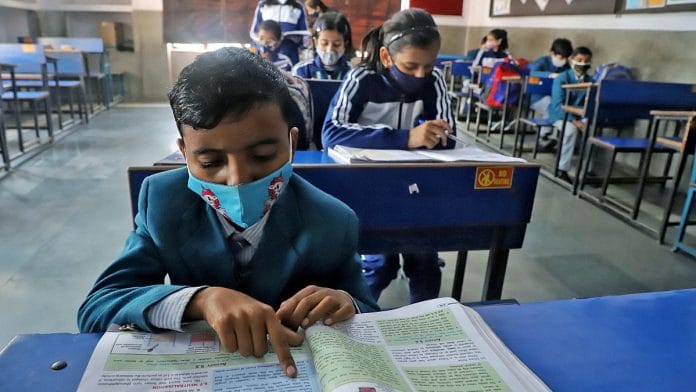New Delhi: The Union government fell short of its targeted expenditure on education in 2023-24 by Rs 7,539 crore, with the amount spent on key schemes in the school education sector such as Samagra Shiksha and midday meal remaining below the allocation made in last year’s annual budget.
The shortfall in meeting the targeted expenditure in running these schemes is significant as the Parliamentary Standing Committee on Education, Women, Children, Youth and Sports — then chaired by BJP Rajya Sabha MP Vinay P Sahasrabuddhe — had in 2022 asked the government to identify the factors behind it.
These details emerged after Union Finance Minister Nirmala Sitharaman presented the interim budget Thursday in which the government has earmarked Rs 1.25 lakh crore for education, which is 14.47 percent more than what it managed to spend so far in this sector in the current financial year.
In 2023-24, the government had set out to spend Rs 1.16 lakh crore on education but spent Rs 1.08 lakh crore, the sector-wise details on expenditure incurred by the central government shows. A closer look at the fine print shows that this gap was essentially an outcome of funds under Samagra Shiksha, midday meal (PM Poshan) and PM SHRI remaining unspent.
For instance, Samagra Shikha, which encompasses all major policies and programmes in school education, received a budgetary allocation of Rs 37,453 crore in 2023-24. However, the revised estimate — which captures the actual expenditure incurred under a particular head — shows that Rs 33,000 was spent to run the scheme.
In the latest budget, the government has set aside Rs 37,500 to support the scheme. It is funded by the central government and states under a 60:40 ratio like in the case of PM Poshan.
In 2023-24, Rs 10,000 crore was spent to run the scheme, as against the allocation of Rs 11,600 crore. This year, PM Poshan received budgetary support of Rs 12,467 crore. In the case of PM SHRI, Rs 4,000 crore was allotted, of which Rs 2,800 crore was spent.
Announced in September 2022, under PM SHRI Schools (PM Schools for Rising India), as many as 14,500 schools across states and Union Territories will be redeveloped by the central government to reflect the key features of the National Education Policy (NEP), 2020.
In addition to the redevelopment of schools, the government is also focusing on the University Grants Commission to ensure that higher education institutions are adequately funded and equipped to meet the needs of students.
The government’s allocation for the University Grants Commission (UGC), which is the apex regulatory body of higher education in India, also saw a steep cut from Rs 5,360 crore in 2023-24 to Rs 2,500 crore in 2024-25.
UGC chairperson M. Jagadesh Kumar, responding to a specific query on the cut, said Thursday that the body will “continue to work in synergy with all stakeholders to ensure the efficient use of allocated funds”.
“It’s important to note that several key areas have witnessed significant funding increases. We are pleased to see a rise in allocations for Central Universities, deemed universities promoted by the central government, research and innovation initiatives, the Pandit Madan Mohan Malviya National Mission on Teachers and Teaching, and PM-USHA (Uchchatar Shiksha Abhiyan), demonstrating our commitment to these crucial areas. From the financial year 2023-24, scholarships have been merged for college and university students with PM-USP Yojna,” Kumar said.
In the 2022 report, the House panel observed that Centrally Sponsored Schemes (CSS) and the Central Sector Schemes (CSeS) “form the backbone of the basic education in the country”.
“But taking note of the figures furnished by the department, it is evident that expenditure towards CSS and CSeS has not been done in a progressive manner and this has led to underutilization of the allocations made,” the committee had said, terming the “underutilization” in such welfare schemes for students as “unacceptable”.
“The Committee recommends that there is an urgent need to put in place effective strategies for utilising the funds. Also, it would be prudent on part of the Department to chalk out alternative mechanisms if it comes to notice that the implementation and utilisation under the Scheme is lagging in any quarter so that course correction could be done,” it had added in the report.
(Edited by Amrtansh Arora)
Also Read: ‘Walked the path of fiscal prudence’ — what economists say about interim budget 2024’s fiscal maths






